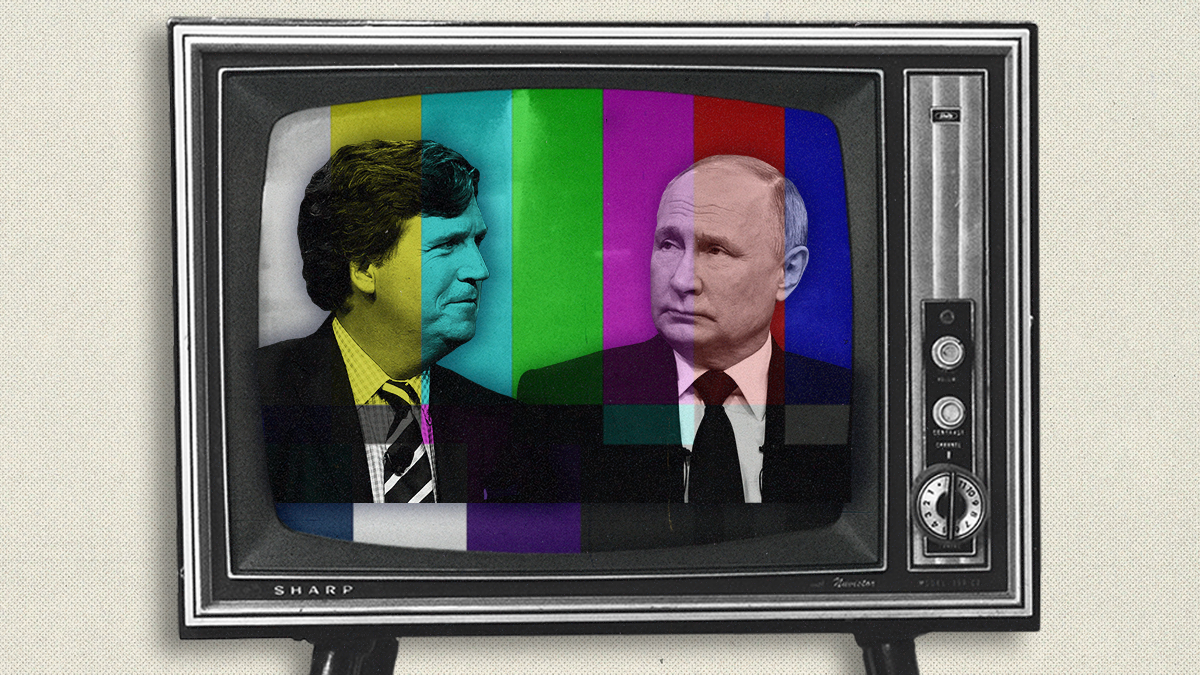Annie Gugliotta
If you were absolutely hankering for an extended lecture on the Varangian Guard, the Rurikid dynasty, the Polish-Lithuanian Commonwealth, or other aspects of medieval and early Russian history, you were on cloud nine for the first 30 entire minutes of Tucker Carlson’s highly anticipated two-hour interview with Vladimir Putin Thursday night.
As for the remaining 90 minutes, here are five things we can tell you:
- On the big subjects, Putin said nothing new. He questioned the basis for Ukrainian sovereignty, blamed Western meddling and NATO expansion for the Ukraine war, and said Washington has treated Russia unfairly since the end of the Cold War. (You can see a rebuttal to this view here.)
- Putin was evasive about whether he’d accept an end to the Ukraine conflict along current lines (see Eurasia Group’s 2024 Top Risk #3). To be fair, why wouldn’t he be? With the war stalemated, Ukraine’s military command in upheaval, and US support in doubt, it would make little sense for Putin to commit to anything at a moment when he may shortly have the upper hand.
- Trump didn't figure much. Carlson asked him if he thought a new US administration would herald better ties with Russia, but Putin said only that Moscow could get along with any US that took Russia’s interests seriously. Donald Trump's absence was conspicuous but understandable: Carlson's audience may share some of Putin's world view (socially conservative nationalism) or his preferences (to stop US funding for Ukraine), but Putin himself is deeply unpopular in the US. Only 10% of Americans have a positive view of him. So while Putin would doubtless love to see Trump 2.0, he probably rightly understands that direct praise probably doesn't help Trump in a general election. More interesting was Putin's fulsome praise for Elon Musk: "There is no stopping [him] ... you need to find some common ground with him." Keeping the owner of Twitter/X and Starlink buttered up is smart.
- This interview won’t make waves in Russia. “Even by Russian state media standards, there was little here that would excite, let alone surprise, a Russian audience,” said Tinatin Japaridze, a Eurasian political risk analyst at Eurasia Group, though she said it would probably reflect well on Putin that a prominent American personality had flown all the way to Moscow to interview him.
- Or, for that matter, in the US. Clips of specific exchanges will probably circulate for a few days on social media, confirming the prior beliefs one way or another of … just about everybody.
Case in point: Carlson asked Putin whether a deal could be reached to free Evan Gershkovich, the American journalist being held in Russia on espionage charges. It has long been assumed Gershkovich would eventually be freed in a prisoner exchange. Putin suggested that this would be "a person, due to patriotic sentiments, [who] eliminated a bandit in one of the European capitals … during the events in the Caucasus.” The FSB assassin Vadim Krasikov, currently imprisoned in Germany, fits this bill.
The Big picture: “If Putin hoped to change minds in the US, it’s pretty safe to say the interview will not accomplish this,” says Alex Brideau, head of Russia research at Eurasia Group.“He was consistent with his past statements offered to justify the invasion of Ukraine, along with his vague willingness to negotiate. But that was the extent of his message, and it’s not something that is going to have an effect on the debates in Washington.”
CORRECTION: An earlier version of this article stated incorrectly that Putin did not mention Trump's name once during the interview. He did mention him once, but only once. See point #3 above for the revised analysis. We regret the error.
